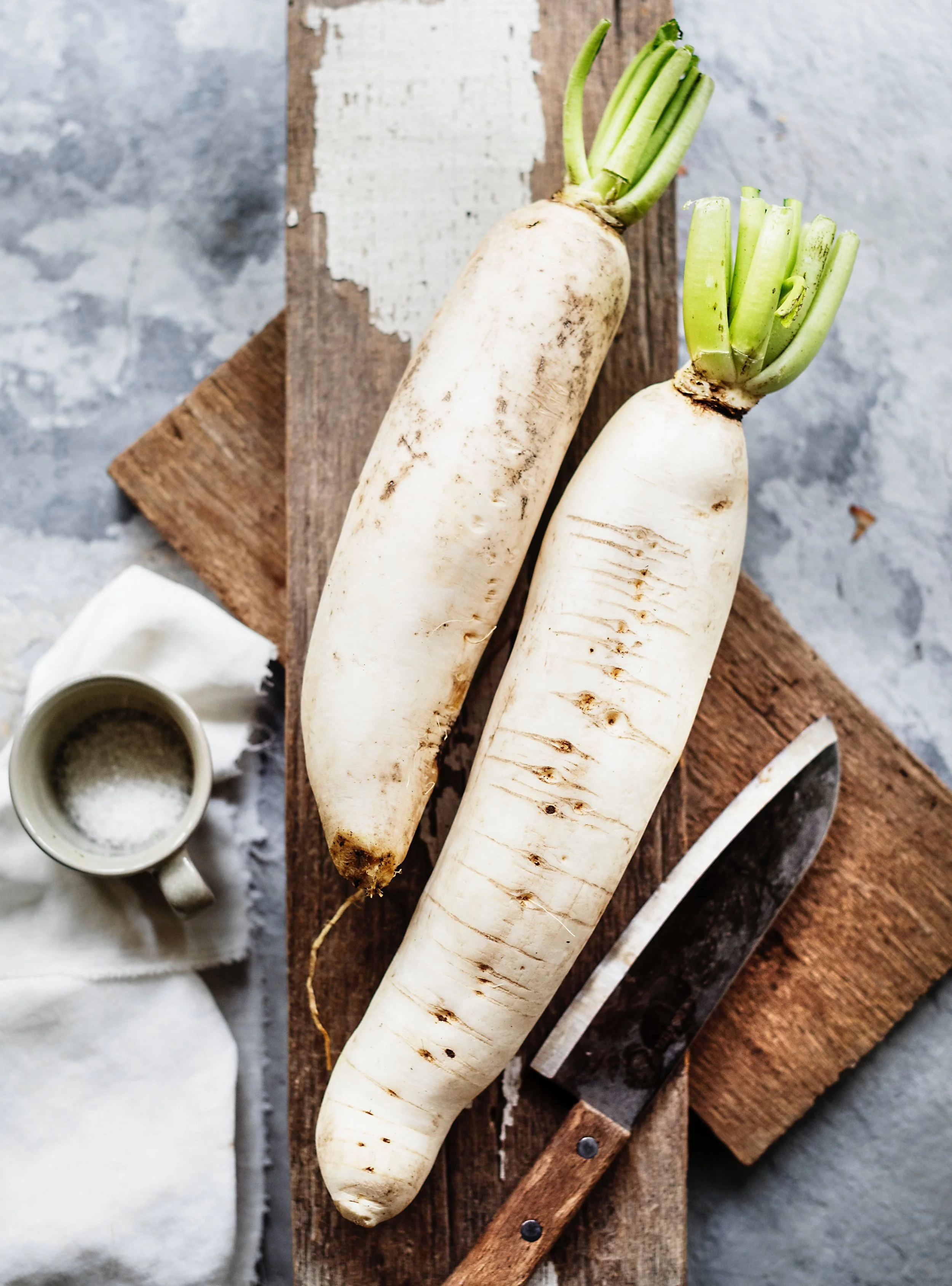“When white radishes are in season, doctors should take a break.” – Chinese proverb
Daikon is a potent cruciferous I used to run away from as a kid. The second my brother and I had a sore throat or slight cough, my grandmother would grate fresh daikon and make us gurgle its spicy, pungent juice. If our tonsils were swollen or infected, she would get a q-tip, dip it in the fresh juice and directly apply to the tonsils. Like magic, our sore throat would be cured by the end of the day. Now as an adult, I love ingesting this tasty veggie pickled, in soups or finely grated.
The origins of my grandmother’s home remedies are unclear as they were a blend of diverse influences. My grandmother was of Quechua and Spanish descent who grew up in Peru with traditional indigenous remedies and common practices. She was raised by her grandmother, the widow of a French naturopath, and strongly influenced by her beloved Chinese mother-in-law who lived with her after getting married. Chinese and Japanese culture is strongly embedded in Peruvian cuisine, traditions and history and is likely where we gained the practice of using daikon medicinally.
Daikon radish, Raphanus Sativus, is a white radish in the Brassicaceae family, also known as cruciferous vegetables, such as broccoli, brussels sprouts, cauliflower, cabbage, bok choy and curly kale. Daikon translates to “great root” in Japanese. Radishes are said to have originated in the Mediterranean and coasts off the Red Sea, later reaching China via trade routes around 500 BCE. However, others say China is the origin because until this day it still grows wild radishes. Daikon radish is a staple in Asian cuisine, especially Japan. In the U.S. daikon is also referred to as Japanese radish, Chinese radish, Winter radish and Asian radish.
In Chinese medicine daikon is spicy, pungent and cooling, and enters the lungs, large intestine, spleen and stomach channels. It clears heat congesting in the lungs which can present with symptoms such as sore throat, dry cough, sputum, or fever. When eaten raw it cools the lungs and when cooked it strengthens the digestion. Its spicy and pungent nature helps to transform phlegm and mucus in the body so that it can be eliminated. It is a great liver detoxifier, cleansing thick toxic mucus residues of animal products from the body, which causes inflammation, feeds tumors and cancers. Because it supports the lungs and digestion, it is also a strong ally for the immune system.
There is a common saying in Chinese: “Eat radish in winter and ginger in summer, and you won't need a doctor to prescribe any medicine.” This is because in the Winter our energy goes inward to keep our core warm in the cooler months. In the winter one eats warming foods and overeats during the holidays, so daikon balances the body by gently cooling and preventing heat buildup in the stomach. Whereas in the Summer, the energy moves to the surface of the body to help regulate temperature. During this time is when one eats colder foods and the stomach has less qi for digestion than in the winter, so ginger is indicated to strengthen the digestive fire to break down summer foods such as salads and ice cream.
One of the main active constituents in daikon, like other cruciferous vegetables, is a potent antioxidant called isothiocyanate (ITC). Numerous mechanistic studies have demonstrated the anti-cancer effects of ITC on various cancer types. The data shows ITC’s suppress tumor growth by generating reactive oxygen species (ROS) or by ending the reproduction cycle of cancerous cells. One of the most well studied ITC’s is Sulforaphane (SFN). SFN has been shown to induce apoptosis, cell death, of pe-cancerous and cancerous cells.
Daikon sprout extract has demonstrated to have high radical scavenging potency, significantly diminishes hepatic damage from cytotoxins, and lower blood sugar in cholesterol in diabetic rats.
While there is a need for more human studies on the health benefits of daikon, one must take into account the thousands of years of empirical data that demonstrates the many uses and health benefits of daikon radish.
